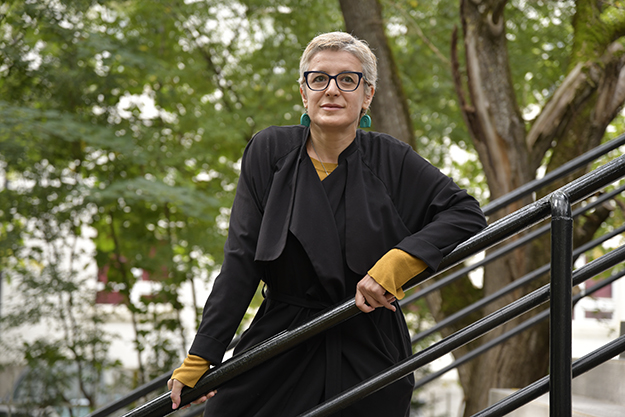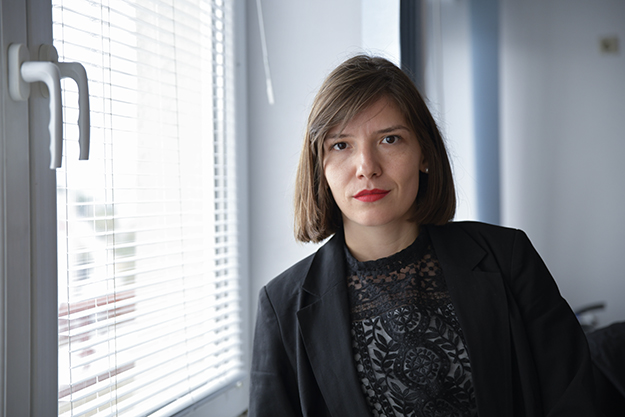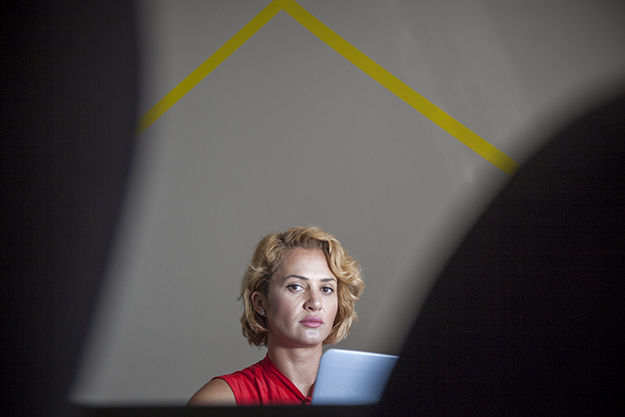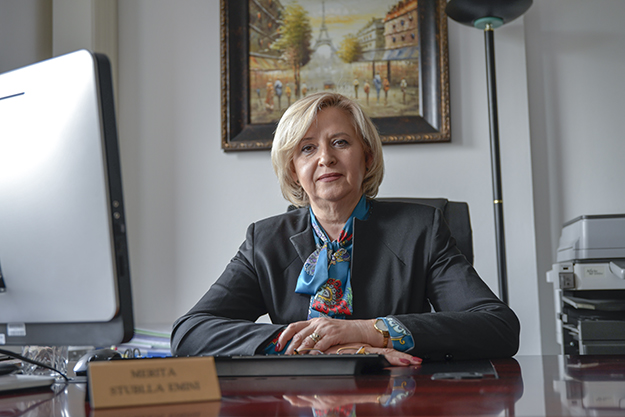Vera*, 53, from Prishtina is the head of her household and the only one responsible for raising her four children after her husband was murdered in the Kosovo war. She considers herself lucky for having had the opportunity to work as a cleaner at the psychiatric ward of the public hospital for a short time, despite the fact that her contract was temporary and expired after three years.
Afterward over the last 16 years, she has worked as a cleaner and elderly caretaker in private homes whenever she stumbled upon a job. Now, her children are grown up, but she recalls how difficult it was to raise them on her own. “Often, I took them with me when I went out to clean. Just to earn our daily bread.”
When asked whether her two daughters are employed and lead a better life, she responds abruptly: “No.” Both of them are now married; one of them also worked as a cleaner until she tied the knot and now lives as a poor housewife.
This course of circumstances in life is not atypical. Women in Kosovo inherit little, remain isolated at home as mothers and housewives, are discouraged from joining the labor market, do not enjoy enough institutional support and are denied justice when requesting the wealth that belongs to them. Only 13% of women in Kosovo are employed, while the percentage of those who are not looking for a job in the first place is 78%.
These forms of discrimination are well-known by now. However, what is not widely known is that women’s poverty differs from that of men, and that the poverty-gender dynamic combined with other identity markers such as class, age, or ethnicity plays a key role in the debate in the economic empowerment of women.
The government's priorities for infrastructural investments suggest that the focus is not on welfare policies and social mobility.
According to the feminist economist Dita Dobranja, poverty in Kosovo is inherited, especially from mother to daughter.
“Studies show that mothers who have their own income invest most of it in their children: In education, healthcare and everything that is to do with their children and the well-being of the family in general,” she explains. “But if a mother has a low income or is poor, she will not have the means to invest in her family.”
According to Dobranja, income over the generations is closely tied into the political and educational systems of a country in particular. According to her, a welfare state with a proper public education system — as is the case with Scandinavian countries — allows for social mobility, which means that a person born into a poor family can progress to the middle or upper classes during their lifetime. Yet, in this regard, the Scandinavian countries are the exception, not the rule.
In Kosovo, the government’s priorities for infrastructural investments suggest that the focus is not on welfare policies and social mobility.
Furthermore, it is difficult to talk about mobility when there is a lack of income security. Mimoza Mustafa, a mathematician and lecturer at RIT University in Kosovo, is a single mother of one. In the absence of financial and moral support from her daughter’s father, she is the only parent who is responsible for her daughter’s upbringing and education.

Mimoza Mustafa, university lecturer and single mother, believes that women in Kosovo are supported only superficially. Photo: Foto: Atdhe Mulla / K2.0.
As a professional who joined the labor market at the age of 21, she says that her years of experience offers a sort of security. But according to her, as soon as you lose your job in Kosovo, you may as well have to sign up for welfare. “How safe can you feel in a place like Kosovo where support for women in general is superficial, and I’m not sure whether single mothers are acknowledged [as such] anywhere, let alone get any kind of support,” she says.
Informal work and social assistance
The COVID-19 pandemic has laid bare the most critical aspects that reflect the poverty of women in Kosovo.
Saxhide Mustafa, vice-director of the Riinvest Institute, a think tank that deals with socio-economic and business-related issues, talks about the effect that the imposed isolation as a consequence of the pandemic has had on the income of women employed in the informal sector.
“The women who suffered the most losses during the pandemic are the ones in the informal sector,” she says. “By that I mean cleaners, babysitters, elderly caretakers or those who do stair maintenance [in apartment buildings]. This also includes women who have private companies but may have not registered them.”
For many other women, their income was not sufficient even before the pandemic.
According to Nora Latifi-Jashari, a socio-economic expert and director at the GAP Institute for Advanced Studies, out of about 25,000 families in Kosovo receiving social assistance, about a third of welfare recipients are women. “The economic situation in Kosovo is very difficult for many groups in society, but it is even more difficult for marginalized groups and especially for women who belong to these groups,” she said.
According to the National Strategy for the Inclusion of Roma and Ashkali Communities 2017-2021, women from these communities are discriminated against in two ways — as women and as members of the Roma and Ashkali communities in particular. The strategy highlights the basic lack of food, housing, access to medicine and health care, employment, and education in these communities..
On the other hand, Dobranja believes that if social schemes were designed in a way that would benefit the most affected people, it would significantly improve poverty relief. Moreover, social scheme trials in various countries have shown that women and men manage available benefits in different ways.
“It is known that women mostly spend their income on their families, especially on food, clothing, medication and education. This also holds true if the income comes from social schemes,” she says. “[In Kosovo] in most families, men are the ones who manage women’s income and they are not given the opportunity to make decisions,” she says.
"Patriarchal mindsets and inadequate institutional support are tying women to their homes."
Vesa Rezniqi-Pallaska, Women for Women Kosovo
The economic superiority of men is still protected by wider society and is not sufficiently addressed by local institutions, and as such is rarely challenged.
Latifi-Jashari explains that for women who want to assume control of their financial income by opening their own business, taking such a step is much more difficult than for men considering that they inherit less real estate and have consequently less access to wealth.
Often, this is especially tough for women in rural areas, due to their limited access to information and resources, as well as their limited mobility.
Vesa Rezniqi-Pallaska, monitoring and evaluation manager at Women for Women Kosovo, an organization that, among other things, deals with entrepreneurship projects and offers support grants for women in agriculture, farming and crafts, says that recipients have various challenges for directing businesses in a more stable way.
“The women who we target have limited access to sales and networking opportunities, as well as to other resources for professional advancement,” she says. “This is the case because patriarchal mindsets and inadequate institutional support through subsidies are tying women to their homes where they engage in agriculture and farming, but do not have an income.”
A sexist labor market
Besides the barriers they have to overcome if they decide to open their own business, women are often excluded from the labor market in general, especially those in their 40s or 50s. According to Dobranja, this type of ageism in Kosovo is not problematized at all, but is reduced to a woman’s “choice.”
“For men, discrimination in this age group is not that pronounced because men are much more economically active than women,” she says. And women who have not been part of the market but want to join are met with difficulties because of huge prejudices such as ‘she’s quite old now, why did she not work before?’”

Feminist economist Dita Dobranja believes that ageism toward women has not been problematized yet in Kosovo. Photo: Atdhe Mulla / K2.0.
In addition to ageism, the way that women are treated through maternity leave policies gives a sense of the practices that in many cases leave women behind in the labor market.
The current Law on Labour, which stipulates six months of maternity leave — during which time 70% of the salary is paid by the employer — is considered very problematic by the private sector and as such has not been widely implemented outside of the public sector. This is because in most cases, businesses — most of which are small- and medium-sized — cannot afford to cover it.
However, there is a new Draft Law set to move along to the Assembly that will particularly regulate maternity and parental leave. This means that the provisions on maternity leave in the current Law on Labour will be scrapped.
According to the NGO coalition, Women Economic Forum, this will prevent women benefiting from their rights prescribed in the Law on Labour. So, the members of this forum have requested the inclusion of maternity leave through a separate article in the Law on Labour.
Furthermore, they have requested that the state bear the financial burden of parental leave through a special fund that would be established for this purpose, as in many EU countries. But Saxhide Mustafa, a member of the Forum, says that the Ministry of Labour and Social Welfare responded by stating that they do not possess sufficient budget to do this, and that the new draft law is in line with EU directives.
Economic violence and institutional discrimination
Agime*, a 41 year-old woman from Drenas, resides at the domestic violence shelter in Prishtina. She has noticeable bruises on her face that, according to her, were caused by the physical violence inflicted upon her by her husband, brother-in-law and sister-in-law. She introduces herself as an extremely poor woman who lives with her husband’s family in a dilapidated house, saying that she has to beg in order to feed herself.
“I don’t dare to eat, I can’t even feed my children. I cannot touch anything without her permission,” she says, referring to her mother-in-law, who she has to to obey lest her husband beats her brutally.
But according to the shelter’s staff, the woman in question is unlike other poor women who have no other choice but to remain in violent environments where even their most basic rights, like access to food, are denied. Agime holds a Croatian residence permit after emigrating to the country with her family at the age of 15. There, she met her husband, got married and returned to Kosovo, a decision he made.
During her 20 year marriage, she says that her brother who lives in Croatia has supported her financially, but that money was taken from her by her husband, brother-in-law and other family members. “My brothers have been keeping me afloat, but they still insult me,” she says, as she explains that her children are the reason she stayed in Kosovo with her husband and his family. Even when it became clear to her that they would not let her take them if she decides to leave the home.
In Kosovo, economic violence is a new concept, even for legal institutions that are obligated to sanction the usage of violence and to protect victims.
So, it is possible that even when women have a good income — regardless of its source — they are often not entitled to it due to violent gender norms in deeply patriarchal societies. To address this type of abuse legally, various EU member states have clear definitions of economic violence.
For example, in the domestic violence section of the Slovak Criminal Code — which dates from 2005 — economic violence is defined as the unjustified denial of food, rest or sleep and denial of necessary personal care, clothing, hygiene, medical care, shelter or education. In Slovenia’s law that addresses domestic violence, economic violence is defined as “undue control or setting of restrictions upon any family member concerning disposing with one’s income or in other words managing the financial assets with which the family member disposes or manages, and it can also mean undue restricting of disposing or managing the common financial assets of family members.”
In Kosovo, economic violence is a new concept in the discourse against domestic violence and violence against women, even for legal institutions that are obligated to sanction the usage of violence and to protect victims. There are also legal uncertainties related to what economic violence is, how it manifests and what the mechanisms of institutional protection are.
This has led to a lack of statistical data at the state level. K2.0 has requested data on economic violence from the Kosovo Police, but has not received a response.
According to Basri Kastrati, head of the Office for Protection and Assistance of Victims in the State Prosecutor’s Office, there is no reported data on economic violence. “Since we have had nothing specifically defined as economic violence, we can not provide statistics, but most victims are ‘threatened’ economically due to dependence on their spouse,” he said.
Yet, clarity and correctness when it comes to legal terminology directly influences the day-to-day work of responsible officers for addressing domestic violence.
Former National Coordinator against Domestic Violence and newly elected Ombudsperson Naim Qelaj says that economic violence along with psychological violence — which are closely linked — are unfamiliar notions to most professionals who apply the Criminal Code. “It is the duty of the Supreme Court to provide clarifications and interpretations on what is meant by economic violence and what the essential elements that determine the existence of this form of violence are,” he said.
In a way, women’s rights activist Luljeta Aliu has taken this task upon herself voluntarily. As a survivor of economic violence by her ex-husband, she has also made efforts to protect what belongs to her public, encouraging other women to do the same.

Women’s rights activist Luljeta Aliu, who has experienced economic violence by her husband, publicly demands justice. Photo: Atdhe Mulla / K2.0.
In 2018, Aliu submitted a request to the Parliamentary Committee on Human Rights that psychological and economic violence be clearly defined within the Law on Protection from Domestic Violence. Following that request, the Commission formed a working group and drafted a new law based on the proposals of the working group. But work on these legal changes has stalled due to the turbulent political situation.
On the other hand, Kastrati says that clarifying economic violence will be easier now that the Assembly has passed the “European Commission Convention for Preventing and Combating Violence Against Women and Domestic Violence,” known as the Istambul Convention. “It is clearly explained there, and after the new law is approved it will be based on the Istanbul Convention because it was ratified in the Assembly and, whether we like it or not, we are obligated to implement it,” he says.
Meanwhile, economic violence against Kosovo women is manifested by barriers that continue even after divorce. Lawyer Merita Emini-Stublla, who represents women in divorce proceedings, says that in 90% of cases men register their property in their own name. And in cases when the couple begins to show dissatisfaction that leads to divorce, the husband gives the property to the brother, father, mother, so as not to enter into the process of sharing the property with the wife.
She says that there was a case in court where a husband registered all the property in the name of his father and refused to pay the wife alimony for the child on the grounds that he did not have enough income available. “You cannot avoid paying alimony if you own land — you may not have cash, but you can sell the land and fulfill your obligations,” she said, adding that she had filed a lawsuit against the registered landowner, i.e. the child’s grandfather.
Feminist advocacy for economic rights
Although in 2016 it became mandatory that property acquired during the marriage must be registered in the name of both spouses, the institutional problems that women face seeking economic justice are big. And coupled with the financial costs required to initiate legal proceedings, it often forces them to give up on justice and remain dependent.
“Property issues can take up to 10 years at court. This sets women back because they have to pay lawyers, taxes, expertise — this money is returned if the case is won,” Emini-Stublla explains. “To undergo filing a case, women have to have around 1,000 euros. And when women don’t have money, they can’t afford initiating anything; they endure physical, psychological and economic violence.”

According to lawyer Merita Emini-Stublla, the costs of divorce proceedings are unaffordable for many women. Photo: Atdhe Mulla / K2.0.
Back in Prishtina’s shelter, Agime recounts her bitter experiences. “One can never find comfort with someone else’s bread,” she says, full of disappointment.
This discomfort — which manifests itself with isolation and multiple types of violence — often end with divorce requests. Emini-Stublla attributes the upward trend of divorce in the last few years to a significant increase in awareness among women who will not keep a violent and unequal marriage together at all costs.
According to her, women and men are still failing to understand the concept of a “common cash box,” something that does not necessarily mean equal money in value. “Sometimes a man chips in 4 euros and a woman 1, or vice versa; “Families are failing to understand that family development is done through joint decisions,” she said.
To Ombudsperson Naim Qelaj, women are aware of the ways they are being discriminated against because they themselves are suffering. According to him, it is men who should be aware that they should give up once and for all the belief and tradition that they have rights that women cannot have.
More than in state policies and in the political will of those responsible, Mimoza Mustafa believes in the insistence of women and girls to be entitled to full human, economic and political rights. “I hope that our insistence as women of any generation, ethnicity, social class and professions will push state and governmental mechanisms to change the discriminatory approach to women,” she said.K
*Editor’s note: The names of the interviewed women were changed to protect their identity.
Feature image: Majlinda Hoxha / K2.0.





